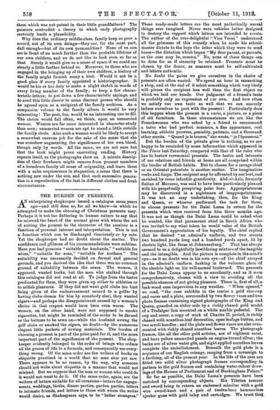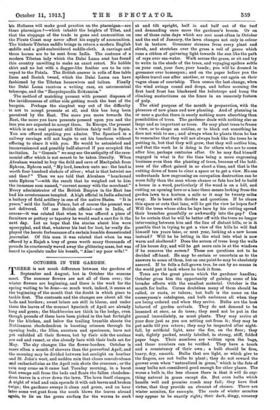THE BURDEN OF PRESENTS.
ANenterprising shopkeeper issued a catalogue some years ago—and still does so, for all we know—in which lie attempted to make the choosing of Christmas presents easy. Perhaps it is not too flattering to human nature to say that he misread the heart of the normal giver with whom the act of suiting the present to the character of the receiver is a function of personal interest and interpretation. This is not a function which can be discharged vicariously or by rote. Yet the shopkeeper had no doubt about the matter. The confidence and glibness of his recommendations were sublime. Here you had presents " suitable for husbands," " suitable for wives," "suitable for sons," "suitable for mothers." The suitability was necessarily decided on formal and general grounds, and you derived the idea that there was no common ground of suitability between the sexes. The women, it appeared, wanted books, but the men who stalked through this catalogue did not read at all. To judge from the tastes predicated for them, they were given up either to athletics or to selfish pleasures. If they did not want golf clubs (no hint being given of the embarrassment caused to a golfer by having clubs chosen for him by somebody else), they wanted cigars—and perhaps the disappointment caused by a woman's choice in that respect would have been even worse. The women, on the other hand, were not supposed to smoke cigarettes, but might be reminded of the socks to be darned or the buttons to be sewn on—while the husband swung the golf clubs or smoked the cigars, no doubt—by the numerous elegant little packets of sewing materials. The burden of choosing a present is part of the price paid for it, and the more important part of the significance of the present. The shop- keeper evidently belonged to the order of beings who reduce all the graces of life to a formula, and consequently see every- thing wrong. Of the same order are the writers of books on etiquette practised in a world that no man ever yet saw. There appears to be no reason, by the way, why someone should not write about etiquette in a manner that would not mislead. But we suppose that the man or woman who could do it would not want to do it. Of the same order, again, are the writers of letters suitable for all occasions—letters for engage- ments, weddings, births, dinner parties, garden parties, letters to intimate friends, and letters to those with whom the writer would desire, as Shakespeare says, to be " better strangers." These ready-made letters are the most pathetically unreal things ever imagined. Never were vehicles better designed to destroy the rapport which letters are intended to create. The author of the ever-delightful " Vice Vera& " understood all the grimness of this comedy when he made his school= master dictate to the boys the letter which they were to send home—the dictation which began "My dear parent, or parents, as the case may be, comma." No, none of these things can be done for us if sincerity be retained. Presents must be chosen by the donor, as manners must be self-cultivated and letters authentic.
No doubt the pains we give ourselves in the choice of presents are often wasted. We spend an hour in ransacking a shop, and at the end of it select something which very likely will please the recipient less well than the first object on which we laid our hands. Our judgment of a friend's taste is probably only an expression of cur own. And how often we satisfy our own taste so well that we can scarcely induce ourselves to part with the present! Particularly does this happen when the present is a curio, a picture, or a piece of old furniture. In those circumstances we are like the Frenchwoman who was asked by a friend to recommend a tutor who had perfect manners, a fine appearance, real learning, athletic prowess, geniality, patience, and a thousand other merits. " Quand je le trouve," she wrote, " je l'epouserai."
But the burden of the private giver is nothing, as we are happy to be reminded by some information which appeared in the Times last Saturday, compared with that of the ruler who has to bestow ceremonial presents. The tastes and interests of our relations and friends at home are all comprised within the border of British habits. But to choose for a savage chief or an Oriental potentate is another matter. The imagination rooks and limps. The recipient may be affronted by our best, and ravished by some infantile grandiosity. Abd-ul-Aziz, formerly Sultan of Morocco, was said to have been particularly pleased with his perpetually perspiring polar bear. Appropriateness may be discovered in a nightmare of inappropriateness. It was not an easy undertaking, then, for the King and Queen, or whoever performed the task for them, to choose presents for the Dalai Lama in return for the presents which were received from him three months ago. It was not as though the Dalai Lama could be asked what he wanted, like that paramount chief in South Africa who was invited to say what token he would value of the British Government's appreciation of his loyalty. The chief replied that he desired " an admiral's uniform, and two streets two hundred yards long and a hundred yards apart, lit by electric light, like those at Johannesburg." That has always seemed to us a delightfully bewildering mixture of the tangible and the intangible. And the picture is complete in the mind's eye—as it no doubt was in his own eye—of the chief arrayed in the admiral's uniform basking in the welcome glare of the electric light on his well-earned boulevard. The presents for the Dalai Lama appear to us excellently, and as it were comprehensively, chosen with a view to avoiding all the possible chances of not giving pleasure. There is, first of all, a teak-wood case impervious to any weather. " When opened," we read, "the case exhibits in the centre a gold rice-cup and cover and a plate, surrounded by two flower vases and two photo frames containing signed photographs of the King and Queen, guarded on either side by a richly chased gold model of a Trafalgar lion mounted on a white marble pedestal. The cup and cover, a copy of work of Charles II. period, is richly chased with acanthus-leaf decoration, open leafage button, and two scroll handles ; and the plate and flower vases are also orna- mented with richly chased acanthus leaves. The photograph frames, like all the other gold articles, are of eighteen carat, and have yellow enamelled panels on engine-turned silver ; the backs are of silver water gilt, and eight applied acanthus leaves complete the embellishment. Beneath the gold plate is a sequence of our English coinage, ranging from a sovereign to a farthing, all of the present year. In the lids of the case are fitted two solid silver photograph frames corresponding iia pattern to the gold frames and containing water-colour draw- ings of the Houses of Parliament and of Buckingham Palace."
So far as possible, the Dalai Lama's presents have been matched by corresponding objects. His Tibetan armour and sword bring in return an embossed scimitar with a gold wire sword-knot and a pair of twelve-bore hammerless ejector guns with gold inlay and cartridges. We trust that his Holiness will make good practice on the ptarmigan—are there ptarmigan ?—which inhabit the heights of Tibet, and that the stoppage of the trade in guns and ammunition on the Pirate Coast may never affect his supply of ammunition. The historic Tibetan saddle brings in return a modern English saddle and a gold-embroidered saddle-cloth. A carriage and three horses are to be sent from India. The costume of a modern Tibetan lady which the Dalai Lama sent has found this country unwilling to make an exact retort. No hobble skirt and no hat with a dagger-like feather are to be con- veyed to the Potala. The British answer is rolls of fine table linen and Scotch tweed, which the Dalai Lama can have fashioned by the Tibetan housewives and tailors. Finally the Dalai Lama receives a writing case, an astronomical telescope, and the "Encyclopaedia Britannica."
The method of matching present with present disposes of the invidiousness of either side getting much the best of the bargain. Perhaps the simplest way out of the difficulty is not to accept presents at all, and this has long been perceived by the East. The more you move towards the East, the more you have presents pressed upon you and the less you are expected to accept them. In Europe, the present which is not a real present still thrives fairly well in Spain. You are offered anything you admire. The Spaniard in a railway carriage will not begin to eat his luncheon without offering to share it with you. He would be astonished and inconvenienced and possibly half-starved if you accepted the invitation. In " Genesis " we may see the antiquity of the cere- monial offer which is not meant to be taken literally. When Abraham wanted to buy the field and cave of Machpelah from Ephron, Ephron said, " My lord, hearken unto me : the land is worth four hundred shekels of silver ; what is that betwixt me and thee?" Then we are told that Abraham " hearkened unto Ephron "—with the result that he weighed out to him the immense sum named, "current money with the merchant." Every administrator of the British Empire in the East has had his covetousness tempted. A high official in India admired a battery of field artillery in one of the native States. " It is yours," said the Indian Prince, but of course the present was not delivered. Of one British official—not in India, of course—it was related that when he was offered a piece of furniture or pottery or tapestry he would send a cart for it the next day. Let us hope that the stories about him were apocryphal, and that, whatever his lust for loot, he'really dis- played the heroic forbearance of a certain humble domesticated journalist. Of this man it was related that when he was offered by a Rajah a tray of gems worth many thousands of pounds he courteously waved away the glittering mass, but was heard to ejaculate under his breath, "Alas ! my poor wife! "















































 Previous page
Previous page